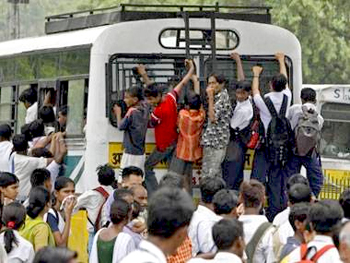 New Delhi, Jul 11: Delhi has become the world's second most populous city in 2014 after Tokyo, more than doubling its population since 1990 to 25 million, according to a UN report.
New Delhi, Jul 11: Delhi has become the world's second most populous city in 2014 after Tokyo, more than doubling its population since 1990 to 25 million, according to a UN report.
The 2014 revision of the World Urbanisation Prospects launched yesterday said that India is projected to add the highest number of people to its urban population by 2050, ahead of China.
The Indian capital is expected to retain the spot of the world's second most populous city through at least 2030, when its population is expected to rise swiftly to 36 million.
Tokyo topped UN's ranking of the most populous cities in 2014 with 38 million inhabitants and while its population is projected to decline, it will remain the world's largest city in 2030 with 37 million people.
Mumbai, which ranks sixth on the list of the world's most populous cities in 2014, is projected to become the fourth largest city in 2030 when its population would grow to 28 million from the current 21 million.
Tokyo and New Delhi were followed by Shanghai with 23 million, and Mexico City, Mumbai and Sao Paulo, each with around 21 million inhabitants in 2014.
The report said that the largest urban growth will take place in India, China and Nigeria between 2014 and 2050, with the three countries accounting for 37 per cent of the projected growth of the world's urban population.
By 2050, India is projected to add 404 million urban dwellers, way more than China's projection of 292 million.
Nigeria will add 212 million to its urban population.
India's current urban population is 410 million people and this will grow to 814 million by 2050.
China currently has the largest urban population of 758 million.
India and China account for 30 per cent of the world’s urban population.
The two Asian giants along with the United States, Brazil, Indonesia, Japan and Russia currently account for more than half of the world's urban population.
About 54 per cent of the world’s population currently lives in urban areas and this proportion is expected to increase to 66 per cent by 2050, with the maximum increase taking place in the urban areas of Africa and Asia.
The world's urban population is now close to 3.9 billion and is expected to reach 6.3 billion in 2050, according to the UN report.
The rural population of the world has grown slowly since 1950 and is expected to reach its peak in a few years.
Approximately 3.4 billion people currently live in rural areas around the world.
However, sometime after 2020, the world's rural population will start to decline and is expected to reach 3. 2 billion in 2050.
India currently has the largest rural population at 857 million, followed by China (635 million).
Together, these two countries account for 45 per cent of the world's rural population.
Between 2014 and 2050, the number of rural residents in India is expected to decline by 52 million.
Four of India's cities Ahmedabad, Bangalore, Chennai and Hyderabad, with 5 to 10 million inhabitants presently, are projected to become megacities in the coming years for a total of seven megacities projected in the country by 2030.
India's major cities Kolkata, Bangalore, Chennai, Hyderabad, Ahmadabad, Pune and Surat will add a total of 27 million people to its population in 2030.
Kolkata, Bangalore, Chennai, Hyderabad will be among the world's top 30 cities by 2030.
Much of the expected urban growth in the world will take place in countries of the developing regions, particularly Africa.
As a result, these countries will face numerous challenges in meeting the needs of their growing urban populations, including for housing, infrastructure, transportation, energy and employment, as well as for basic services such as education and health care.
"Managing urban areas has become one of the most important development challenges of the 21st century. Our success or failure in building sustainable cities will be a major factor in the success of the post-2015 UN development agenda," Director of the Population Division in the UN's Department of Economic and Social Affairs John Wilmoth said.
The report notes that in 1990, there were ten "mega-cities" with 10 million inhabitants or more, which were home to 153 million people.
In 2014, there are 28 mega-cities worldwide, home to 453 million people or about 12 per cent of the world's urban dwellers.
By 2030, the world is projected to have 41 mega-cities.
The report notes that a successful urban planning agenda would require that attention be given to urban settlements of all sizes.
Well managed cities offer important opportunities for economic development and for expanding access to basic services, including health care and education for large numbers of people.
Providing public transportation, as well as housing, electricity, water and sanitation for a densely settled urban population is typically cheaper and less environmentally damaging than providing a similar level of services to a dispersed rural population, the report said.






Comments
Add new comment